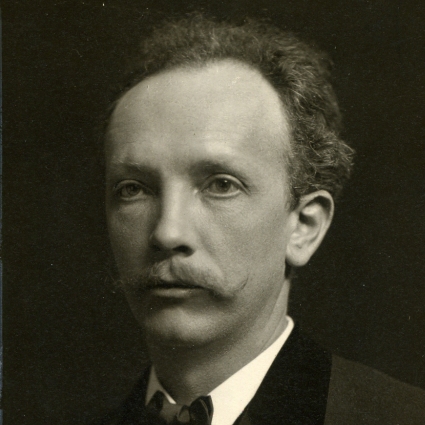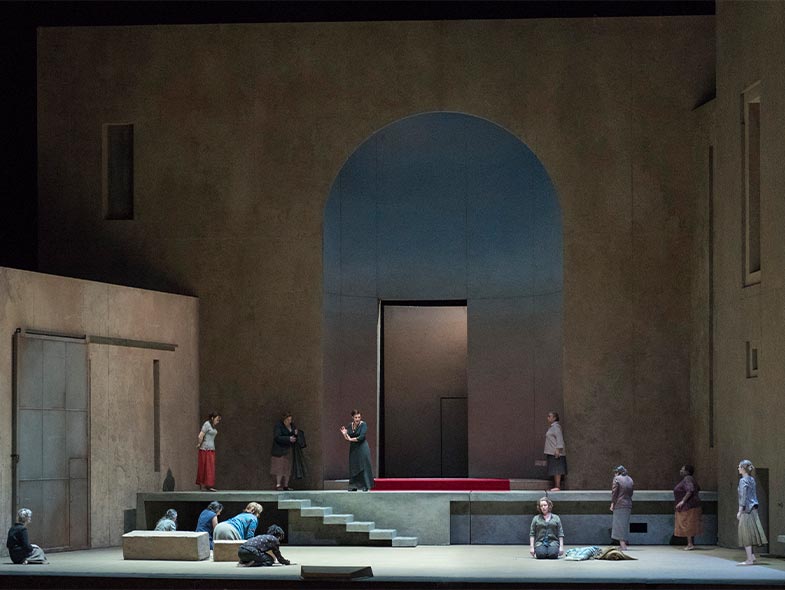
Richard Strauss
Elektra
This production ran: Apr 1 - Apr 20
This Production is in the past
Overview
Soprano Nina Stemme brought down the house when she headlined the premiere of visionary director Patrice Chéreau’s 2016 staging of Elektra. Now she returns to Strauss’s unhinged heroine, opposite one of today’s most in-demand artists, soprano Lise Davidsen, as her sister, Chrysothemis. Donald Runnicles is on the podium for one of opera’s most blistering scores, leading a cast that also includes mezzo-soprano Michaela Schuster as Klytämnestra, tenor Stefan Vinke as Aegisth, and bass-baritone Greer Grimsley as Orest.
All audience members must be fully vaccinated against Covid-19 and wear face masks at all times inside the Met, except when eating or drinking in designated areas. For more information on health and safety policies, visit our commitment page.
Co-production of the Metropolitan Opera, New York; Teatro alla Scala, Milan; the Festival d’Aix-en Provence; the Finnish National Opera, Helsinki; the Staatsoper Unter den Linden, Berlin; and the Gran Teatre del Liceu, Barcelona
Production a gift of Robert L. Turner
Additional funding from the National Endowment for the Arts
Revival a gift of Marina Kellen French
Languages
Languages sung in Elektra
Sung In
German
Titles
Title languages displayed for Elektra
Met Titles In
- English
- German
- Spanish
Timeline
Timeline for the show, Elektra
Estimated Run Time
1 hrs 39 mins
-
House Opens
-
99 mins
-
Opera Ends

World premiere: Hofoper, Dresden, 1909
Shortly after conquering the opera world with his scandalous masterpiece Salome, Richard Strauss turned to Hugo von Hofmannsthal’s recent adaptation of Sophocles’s Electra for his next project. The resulting opera is an intense and still-startling work that unites the commanding impact of Greek tragedy with the unsettling insights of early-20th-century Freudian psychology. The drama unfolds in a single act of rare vocal and orchestral power.
Creators
Munich-born Richard Strauss (1864–1949) composed an impressive body of orchestral works and songs before devoting the second half of his long and productive career to the stage. Elektra marks his first collaboration with Viennese author and poet Hugo von Hofmannsthal (1874–1929), who would go on to write five other librettos for Strauss over the following 20 years, in one of the most remarkable partnerships in theater history.
PRODUCTION
Patrice Chéreau
Set Designer
Richard Peduzzi
COSTUME DESIGNER
Caroline de Vivaise
LIGHTING DESIGNER
Dominique Bruguière

Composer
Richard Strauss
Articles
Setting

The story takes place in Mycenae, Greece, some years after the end of the Trojan War. This mythically resonant era has inspired opera composers for centuries, including Monteverdi (Il Ritorno d’Ulisse in Patria, 1640), Gluck (Iphigénie en Tauride, 1779), Mozart (Idomeneo, 1781), Strauss himself (Die Ägyptische Helena, 1928), and, more recently, Marvin David Levy (Mourning Becomes Electra, 1967). The Met’s production is set in an unspecified contemporary space.
Music
The orchestra for Elektra is often cited as the largest for any repertory opera. It opens and closes the drama with a crashing motive that represents Agamemnon, Elektra’s father, who even in death dominates the lives of his family. The score encompasses an astonishing range of musical color: There are moments of sublime lyricism when the characters express tenderness or love, and there is brutal, harsh dissonance when they are at (or beyond) the bounds of sanity.
